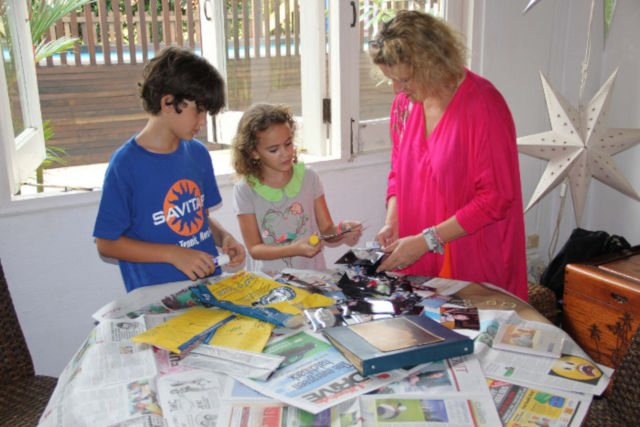Did you feel an ache in your heart when your child ran to your helper instead of to you when he was hurt? Or felt a little tug of jealousy when he cried copiously saying goodbye to her at the airport when it was time for her to leave?

Much as we want to bond with our child and build a strong relationship, as working parents, sometimes we just don’t have the time nor the energy. But if we don’t build that bond and attachment especially in the early years, it may become difficult later for a trusting and meaningful relationship to develop.
I speak from experience that investing time and energy in my children when they were younger has reaped benefits. I see nothing of the angst or the door slamming or the sullenness in my two teenagers and one tween. Contrary to what many parents complain about not being able to get through to their teens, I have a wonderful relationship with my boys. We talk all the time and they confide in me.
Research has shown that children who have strong, healthy and secure relationships with a parent are at an advantage cognitively, socially and emotionally over their peers who do not have such a relationship. Working parents don’t have much time, but we can certainly turn that time into quality time with our children to build a strong relationship. Here’s how.
How to Bond With Your Child
1. Play with Your Child

Don’t let your helper be the one at the playground pushing your boy on the swing or the one playing doll with your girl. If he’s gaming on the console, join him for a shoot-out or two! Children feel loved and appreciated when they get their parents’ attention through play. Playing together also helps you to get to know your child better – his likes and dislikes, and his idiosyncrasies. It’s also a great stress reliever for overworked parents.
⇒ Related Read: Top Indoor Playgrounds in Singapore
2. Teach Values through Play
Playing can be used for teachable moments too. Depending on the situation, use these fun sessions to teach values: for example, perseverance (build that helicopter until you get it right), resilience (pick yourself up), teamwork (let’s see how we can win this game together), compassion (when playing pretend doctor). Teach your children the values that will guide them in life.
3. Care for Your Child

Research shows that when children are in distress, they typically turn to the primary caregiver for comfort even when they have a good relationship with the secondary caregiver. As working parents, we would be secondary caregivers since most of the caregiving chores are done by our helper or the childcare. So we need to show our child that we will take care of him any opportunity that we get.
For example, when the family goes on an outing, you should be the one carrying your child. Let the helper carry the bag. At meal times, you feed the child, not read the newspapers. If he is sick, you, not the helper, should sleep with him through the night. If he cries, you comfort him. Don’t delegate the responsibility of comforting!
I remember when my second boy was six, he had a tendency to throw up his dinner in the middle of the night when he was asleep. My husband and I would take it on ourselves to clean him and the room up, even though we were exhausted. We didn’t bother our helper. Years later, I am gratified he still remembers the incidents. I believe that’s how we can foster filial piety and gratitude.
Caregiving is tough, but it is our responsibility as parents to take care of our children as much as we can.
⇒ Related Read: Teaching Your Children The Value of Empathy
4. Tuck Your Child to Bed
Read him a bedtime story. Or simply tell him about your childhood, one story a day. It takes only fifteen minutes every day but you build a lifetime of memories. If you are always busy, how about committing to tucking him in once or twice every week. Build a routine that your child can look forward to.
5. Have Meals Together

Again, this is a routine that is hard to keep up because we are often never home early enough for dinner together. But it’s a commitment we need to make to show our children that they are more important than our work. For older children, meal times are often the only time they have to interact and have deeper conversations with mom and dad. When we establish a regular meal routine, our children often reciprocate.
⇒ Related Read: The Magic of Eating Together
For instance, my eighteen year old knows not to schedule dinner outings with his friends on Saturdays because that is “family dinner” day, which includes the grandparents. I appreciate that he often cuts short his outings (and that’s a big sacrifice for teens) just so he can join us all for dinner. If we set the example that family always comes first and show the commitment, our children will do likewise, and that’s an attitude we want to cultivate.
6. Accept Your Child for Who He Is

It’s important that your child knows you love him for who he is, not what he can accomplish. If he is shy and introverted, then don’t push him to speak up or do things just to impress your friends. If your child can’t read at four but the neighbour’s can, there is no need to make your child feel bad about it. Perhaps your intent is to motivate him, but criticizing and comparing children can often do more harm than good. They may grow up with little confidence, questioning their own self-worth and be less than they can be.
7. Touch and Hug Your Child Often

Touching creates a sense of belonging and reinforces that the relationship is affirming and secure. It also reduces anxiety and stress. Research has shown that infants and young children who lack touch are less likely to thrive.
⇒ Related Read: 10 Reasons To Hug Your Child Everyday
8. Discipline is Important

Because we spend the bulk of our time away from our child, many working parents try to compensate by being over-indulgent; not just with material things, but also letting the child get away with bad behavior. When we do not set boundaries or enforce consequences to bad behavior, we can often lose control of the situation and respect of the child over time. This can become a big problem when the child is in his teens. Experts say that when parents discipline children, it’s helping them learn self-control, a vital skill that they can fall back on to make wise decisions in later years.
⇒ Related Read: Top 5 Discipline Mistakes Parents Make
9. Use Gadgets in the Right Way
Put that phone or tablet down. That goes for you and the child. How often have we seen in restaurants parents and children staring intently at their devices instead of interacting with one another? It’s a lost opportunity to bond! On the other hand, technology is a great way to bond with your child when you are not together or are overseas. Stay in touch, share happy moments, share secrets! Use the tools they use – Whatsapp, Tik Tok, Instagram.
10. It’s Our Commitment to our Family
I got the views of two Labour MPs from NTUC who agree that “everything will fall into place when we make a commitment to our family.” As working parents are usually harassed for time, “planning is essential”, says Labour MP Zainal Sapari. He sets aside time in advance for his children’s birthdays, graduations and anything that’s important to them.
 Photo: Zainal Bin Sapari Facebook page
Photo: Zainal Bin Sapari Facebook page
Likewise, his counterpart, Labour MP Patrick Tay, blocks off one week in June and December annually to spend uninterrupted time with the family, besides using Whatsapp to constantly stay in touch.
The Labour Movement is encouraging employers to be more supportive of employees’ family needs and commitments and underscore the point that staff with happy, healthy family lives will also be happier people at work.
Spending Quality Time means taking Many Small, Deliberate Actions
Spending quality time with our children means taking deliberate actions through many hours of small moments. Only when we invest that time and effort can we build lasting, trusting and mutually reinforcing relationships. It’s more than just providing our children with a comfortable life and meeting their material needs. It’s about nurturing them so that they grow up into secure, confident and successful adults.
By LK Lai.
LK has travelled the world as a news journalist and enjoys interacting with people and listening to their stories. She likes to pen her thoughts and observations on family life, work issues, and anything that impacts societal development. She gets her inspiration from observing the antics of her three teen-aged boys and what goes on online.
* * * * *
Like what you see here? Get parenting tips and stories straight to your inbox! Join our mailing list here.
Want to be heard 👂 and seen 👀 by over 100,000 parents in Singapore? We can help! Leave your contact here and we’ll be in touch.



























































Leave a Comment: